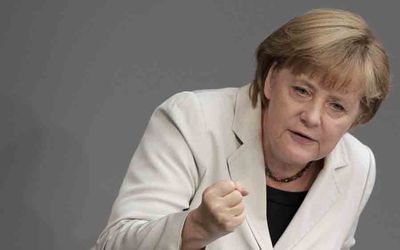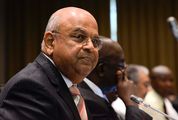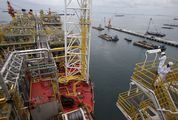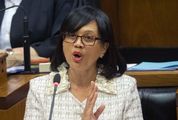Germany backs increase in defence spending
by Birgit Jennen and Rainer Buergin,
2016-03-23 15:28:30.0
BERLIN/FRANKFURT — Chancellor Angela Merkel’s Cabinet backed increases in German spending on defence and infrastructure in a budget plan that seeks to address global risks and the refugee crisis that is her biggest domestic challenge.
The blueprint, approved by ministers on Wednesday, foresees a 2.7% increase in spending next year and balanced federal budgets through 2020, according to a draft obtained by Bloomberg. While the defence ministry is slated to get 6.8% more funding in 2017 compared with previous plans, the biggest absolute increase is for social-welfare and labour-market programmes. That partly reflects spending to aid about 1-million refugees who came to Germany last year, the most since the Second World War.
"Besides measures related to the refugee influx, the focus of the additional impulses is on domestic and exterior security," according to the budget document.
Finance Minister Wolfgang Schaeuble is due to present the plan, which will underpin three months of detailed budget talks in parliament, at a news conference at 11:30am in Berlin time.
With stepped-up spending for asylum seekers as well as German residents, Ms Merkel’s budget priorities amount to a fiscal stimulus for Europe’s biggest economy and underscore a reduced reliance on exports to drive growth. Mr Schaeuble agreed to add social spending demanded by the Social Democrats, Ms Merkel’s junior coalition partner, who argue the government needs to avoid the impression that lower-income native-born Germans are being short-changed.
Building companies are poised to benefit from increased funding for public housing and €3bn in extra spending on roads, rail and broadband earmarked for 2017 and 2018.
"One of the biggest beneficiaries of the 2017 budget is the construction industry, they will benefit from the planned expenditure for social housing," Tobias Hentze, a budget analyst at the IW economic institute in Cologne, said.
Leopard tanks
As Ms Merkel faces criticism at home and abroad for her open-border policy on refugees, her promise to German voters to avoid new government debt is under attack from the Social Democrats. Balanced budgets "shouldn’t become a fetish", Thorsten Schaefer-Guembel, the party’s deputy national leader, said in a Deutschlandfunk radio interview on Wednesday.
Under the plan, Germany would spend an additional €9.4bn on military equipment between 2017 and 2020. Next year, defence spending would increase to €36.6bn, or 11% of planned federal spending of €325.5bn, according to the draft.
That is part of a €130bn, 15-year defence spending plan presented by Defence Minister Ursula von der Leyen in January, which calls for additional Leopard main battle tanks as well as armoured vehicles for Germany’s armed forces.
"We have benefited over many decades from our allies in Nato (North Atlantic Treaty Organisation) who protected us," Mr von der Leyen said in an interview on Charlie Rose in March. "So it’s kind of time to pay back."
Bloomberg

German Chancellor Angela Merkel. Picture: REUTERS
BERLIN/FRANKFURT — Chancellor Angela Merkel’s Cabinet backed increases in German spending on defence and infrastructure in a budget plan that seeks to address global risks and the refugee crisis that is her biggest domestic challenge.
The blueprint, approved by ministers on Wednesday, foresees a 2.7% increase in spending next year and balanced federal budgets through 2020, according to a draft obtained by Bloomberg. While the defence ministry is slated to get 6.8% more funding in 2017 compared with previous plans, the biggest absolute increase is for social-welfare and labour-market programmes. That partly reflects spending to aid about 1-million refugees who came to Germany last year, the most since the Second World War.
"Besides measures related to the refugee influx, the focus of the additional impulses is on domestic and exterior security," according to the budget document.
Finance Minister Wolfgang Schaeuble is due to present the plan, which will underpin three months of detailed budget talks in parliament, at a news conference at 11:30am in Berlin time.
With stepped-up spending for asylum seekers as well as German residents, Ms Merkel’s budget priorities amount to a fiscal stimulus for Europe’s biggest economy and underscore a reduced reliance on exports to drive growth. Mr Schaeuble agreed to add social spending demanded by the Social Democrats, Ms Merkel’s junior coalition partner, who argue the government needs to avoid the impression that lower-income native-born Germans are being short-changed.
Building companies are poised to benefit from increased funding for public housing and €3bn in extra spending on roads, rail and broadband earmarked for 2017 and 2018.
"One of the biggest beneficiaries of the 2017 budget is the construction industry, they will benefit from the planned expenditure for social housing," Tobias Hentze, a budget analyst at the IW economic institute in Cologne, said.
Leopard tanks
As Ms Merkel faces criticism at home and abroad for her open-border policy on refugees, her promise to German voters to avoid new government debt is under attack from the Social Democrats. Balanced budgets "shouldn’t become a fetish", Thorsten Schaefer-Guembel, the party’s deputy national leader, said in a Deutschlandfunk radio interview on Wednesday.
Under the plan, Germany would spend an additional €9.4bn on military equipment between 2017 and 2020. Next year, defence spending would increase to €36.6bn, or 11% of planned federal spending of €325.5bn, according to the draft.
That is part of a €130bn, 15-year defence spending plan presented by Defence Minister Ursula von der Leyen in January, which calls for additional Leopard main battle tanks as well as armoured vehicles for Germany’s armed forces.
"We have benefited over many decades from our allies in Nato (North Atlantic Treaty Organisation) who protected us," Mr von der Leyen said in an interview on Charlie Rose in March. "So it’s kind of time to pay back."
Bloomberg





















Change: 1.37%
Change: 1.32%
Change: 2.91%
Change: 0.45%
Change: 3.09%
Data supplied by Profile Data
Change: 1.59%
Change: 0.47%
Change: 1.37%
Change: 0.00%
Change: 0.44%
Data supplied by Profile Data
Change: -0.02%
Change: -0.23%
Change: -0.17%
Change: 0.08%
Change: -0.34%
Data supplied by Profile Data
Change: 0.22%
Change: 0.42%
Change: 0.07%
Change: 0.36%
Change: -1.12%
Data supplied by Profile Data